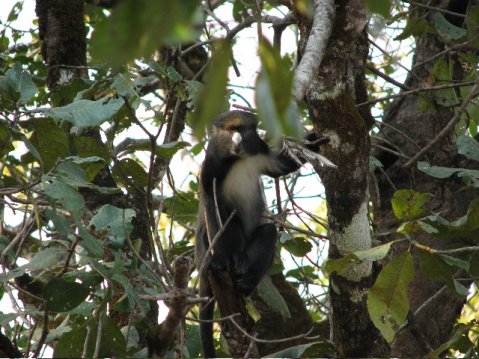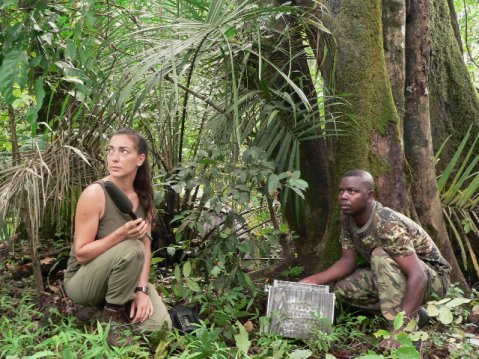Meaningful monkey calls

Researchers have found that monkeys combine calls to make them meaningful in the same way that humans do.
The new study by the University of St Andrews may provide fresh insights into the evolution of human language.
St Andrews’ researchers Dr Klaus Zuberbühler and Kate Arnold studied putty-nosed monkeys in Nigeria, where they recorded monkeys combining distinct alarm calls in particular ways to convey different meanings.
The new findings challenge the notion that combining signals was an essential step in the evolution of human language, emerging late as a response to a growing repertoire.
Dr Zuberbühler, of the University’s School of Psychology, said, “Our research has revealed some interesting parallels in the vocal behaviour of forest monkeys and this crucial feature of human language.”
At some point, according to the theory, it became more economical for humans to combine existing elements of communication, rather than adding new ones to a large repertoire. This is based on the notion that signals would be combined only once the number of them had grown sufficiently.
Dr Zuberbühler explained, “Our research shows that these assumptions may not be correct. Putty-nosed monkeys have very small vocal repertoires, but nevertheless we observe meaningful combinatorial signalling.”

The new study follows previous insights into calls made by male putty-nosed monkeys – in 2006, the St Andrews’ researchers found that the monkeys produce different series of alarm calls in order to distinguish which predator they are responding to.
The latest research provides evidence that the various calls by contain at least three types of information – the event witnessed, the caller’s identity, and whether he intends to travel, all of which are recognised by other monkeys.
The research indicates that non-human primates find it easier to combine a limited number of calls into one meaningful signal rather than expand their repertoire.
 Dr Zuberbühler explained, “Most primates are limited in the number of signals they can physically produce due to their lack of tongue control. The only way to escape this constraint may be to combine the few calls they have into more complex sequences. In other words, it may be harder for non-human primates to evolve large repertoires than to evolve the ability to combine signals. Hence, the evolution of combinatorial signalling may not be driven by too many signals but rather by too few.
Dr Zuberbühler explained, “Most primates are limited in the number of signals they can physically produce due to their lack of tongue control. The only way to escape this constraint may be to combine the few calls they have into more complex sequences. In other words, it may be harder for non-human primates to evolve large repertoires than to evolve the ability to combine signals. Hence, the evolution of combinatorial signalling may not be driven by too many signals but rather by too few.
“It is very likely that further investigations will reveal more such examples in the natural communication of monkeys and apes, and such findings will have profound implications for theories of human language evolution,” commented Dr Zuberbühler.
The research is published in Current Biology, Vol 18 No 5, March 11, 2008.
ENDS
NOTE TO EDITORS:
THE RESEARCHERS ARE AVAILABLE FOR INTERVIEW:
KATE ARNOLD, TEL 00882 1621 157845
KLAUS ZUBERBÜHLER, [email protected]
NOTE TO PICTURE / NEW MEDIA EDITORS:
IMAGES AND SOUND FILES ARE AVAILABLE FROM THE PRESS OFFICE – CONTACTS BELOW. PLEASE CREDIT KATE ARNOLD.
Issued by the Press Office, University of St Andrews
Contact Gayle Cook, Press Officer on 01334 467227 / 462529, mobile 07900 050 103, or email [email protected]
Ref: meaningful monkey calls 100308
View the latest University press releases at www.st-andrews.ac.uk
Category Research